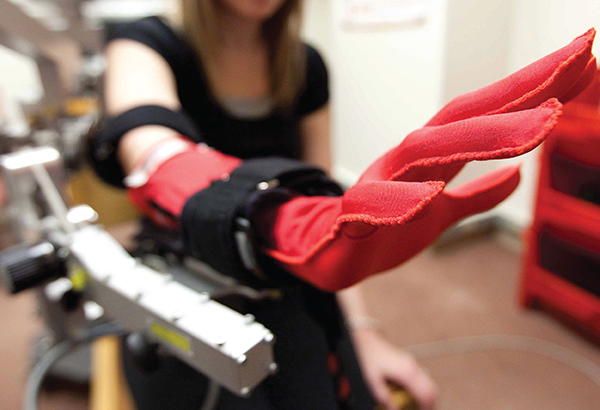Header Skipped.
Parkinson’s Disease
Parkinson’s disease (PD) is far more than a movement disorder. It’s a thief. Spaulding Rehabilitation understands the toll it can take on you and your family. But we also know how to help you take back control and take back your life. Our interdisciplinary team of medical led professionals believe the right combination of medical treatment and physical and occupational therapy can help you maintain your functionality and your freedom.
With each passing year, the evolving knowledge of Parkinson’s disease combined with improvements in medical intervention and rehabilitation techniques offer new hope. Research also shows how complex and individualized Parkinson’s and related movement disorders really are, which informs our approach: we believe the right, comprehensive rehabilitation can extend your ability to remain active and keep you living at home longer.
What Is Parkinson's Disease?
Parkinson's disease is a disorder that affects the nervous system. It gradually worsens over time and eventually robs the person of their ability to move or control their physical movements. Small tremors that are barely noticeable may indicate the beginnings of the disease. As it continues to progress, stiffness may eventually lead to slower, more uncertain movements. There is no cure for Parkinson's disease, although there are many treatment options that can be used to help sustain quality of life for as long as possible.
What Causes Parkinson's Disease?
The cause of Parkinson's disease is still unknown. Some researchers are under the impression that genetics may play a key role in how the body loses its ability to produce enough dopamine. Without adequate amounts of dopamine, brain activity changes and begins to become more erratic. This results in abnormal movements and many of the other symptoms associated with Parkinson's disease. There is also speculation that environmental triggers such as exposure to specific toxins may also increase the risk of developing Parkinson's disease.
What Are the Symptoms of Parkinson's Disease?
Parkinson's disease affects each person differently. The first symptoms of Parkinson's disease may go unnoticeable for a long period of time. In the beginning, the symptoms are primarily limited to one side of the body, but will gradually affect both sides. Changes in speech and writing will become more noticeable as well. Tight, or rigid muscles, may begin to lead to slow movements. Trembling in the limbs and gradually larger portions of the body may become more pronounced. Eventually, pain and fatigue will become more common and will affect every waking moment of the patient's life.
How to Treat Parkinson's Disease
Advancements in medicine have provided a wealth of new medications that are now being used to treat Parkinson's disease and slow down its progression. There are also a few surgical procedures that have been used in the past to try and stimulate the brain and improve its overall function. Along with the new medical treatments for Parkinson's disease, there are several non-traditional forms that have produced incredible results for many Parkinson’s patients. Eating healthy foods and regular exercise will help to keep the body strong and resilient. Deep tissue massage and yoga can flex the muscles without putting excessive amounts of stress on the body. Music and pet therapy may also be beneficial at relaxing the body and the mind.
Levels of Care
With a combination of highly trained people and the most advanced rehabilitation treatments and research available, Spaulding Rehabilitation is here to make a difference in your life and to help you navigate the challenging waters that Parkinson’s disease presents.
-
Hospital Rehab
-
Outpatient
Spaulding's Approach to Parkinson’s Disease
Whether you are in the early or advanced stages of Parkinson’s disease, our experts in neuro-rehabilitation will help you get the most out of each day. We will create a treatment plan specific to your needs with careful attention to the effectiveness of medications. You will learn strategies and techniques to deal with the multiple effects of PD (from tremors and gait disturbance to depression and lack of energy), that you can apply in your daily activities.
Our multiple levels of care throughout Spaulding Rehabilitation can meet your needs at every stage of the disease.
Inpatient Parkinson's Program
Spaulding’s Inpatient Parkinson’s Program components may include:
- Comprehensive management of the person’s medical, functional, and behavioral needs with a focus on promoting independence and safety
- Medical consultation with neurologist or rehabilitation physician
- 24-hour nursing care with a focus on medication management
- Physical, occupational, and speech therapies as needed
- Education for patient and family
- Nutrition counseling and support
- Advanced rehabilitation technologies, including assistive technologies, body-weight support systems, and electrical stimulation devices
- Speech therapies including the Lee Silverman Voice Treatment (LSVT)
Therapeutic recreation - Education in fall prevention
Outpatient Parkinson’s Program
Spaulding's Outpatient Parkinson’s Program components may include:
- Comprehensive evaluation of the patient’s medical, functional, and behavioral status
- Physical, occupational, and speech therapies as needed, including LSVT
- Parkinson’s Exercise and Wellness Program
- Parkinson’s Healthy Mindset Program
- Adaptive Sports Program
- Vibrant Voices
- Orthotics Clinic
- Wheelchair Clinic
- Spaulding Cape Cod Rock Steady Boxing Program
Read the Rock Steady Boxing Program flyer (PDF) >
-
Hope Empowered by Research
Spaulding is conducting research to advance function and quality of life for persons living with Parkinson’s disease. Spaulding physicians and other clinicians are pursuing three research studies and clinical trials focused on monitoring motor fluctuations with a wearable sensor system and predicting upper limb rigidity by analyzing speech patterns.
Motion Analysis Lab

The Motion Analysis Lab (MAL) at Spaulding Rehabilitation Hospital brings state-of the art technology and internationally-recognized expertise to the study and treatment of mobility-limiting conditions, including cerebral palsy, stroke, traumatic brain injury,spinal cord injury and Parkinson’s Disease.

